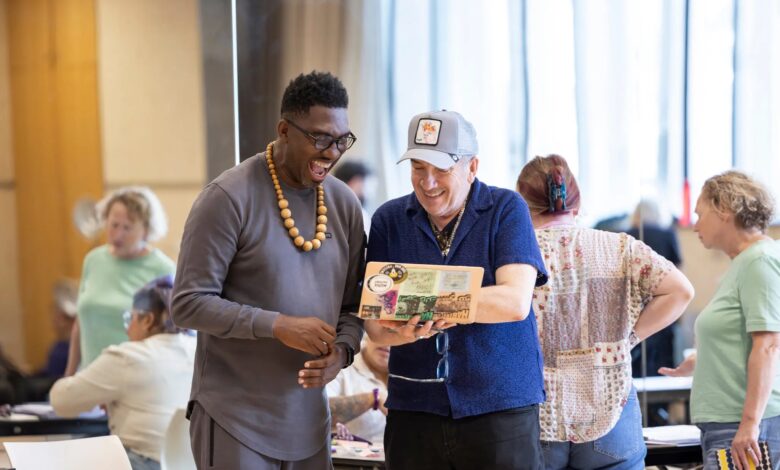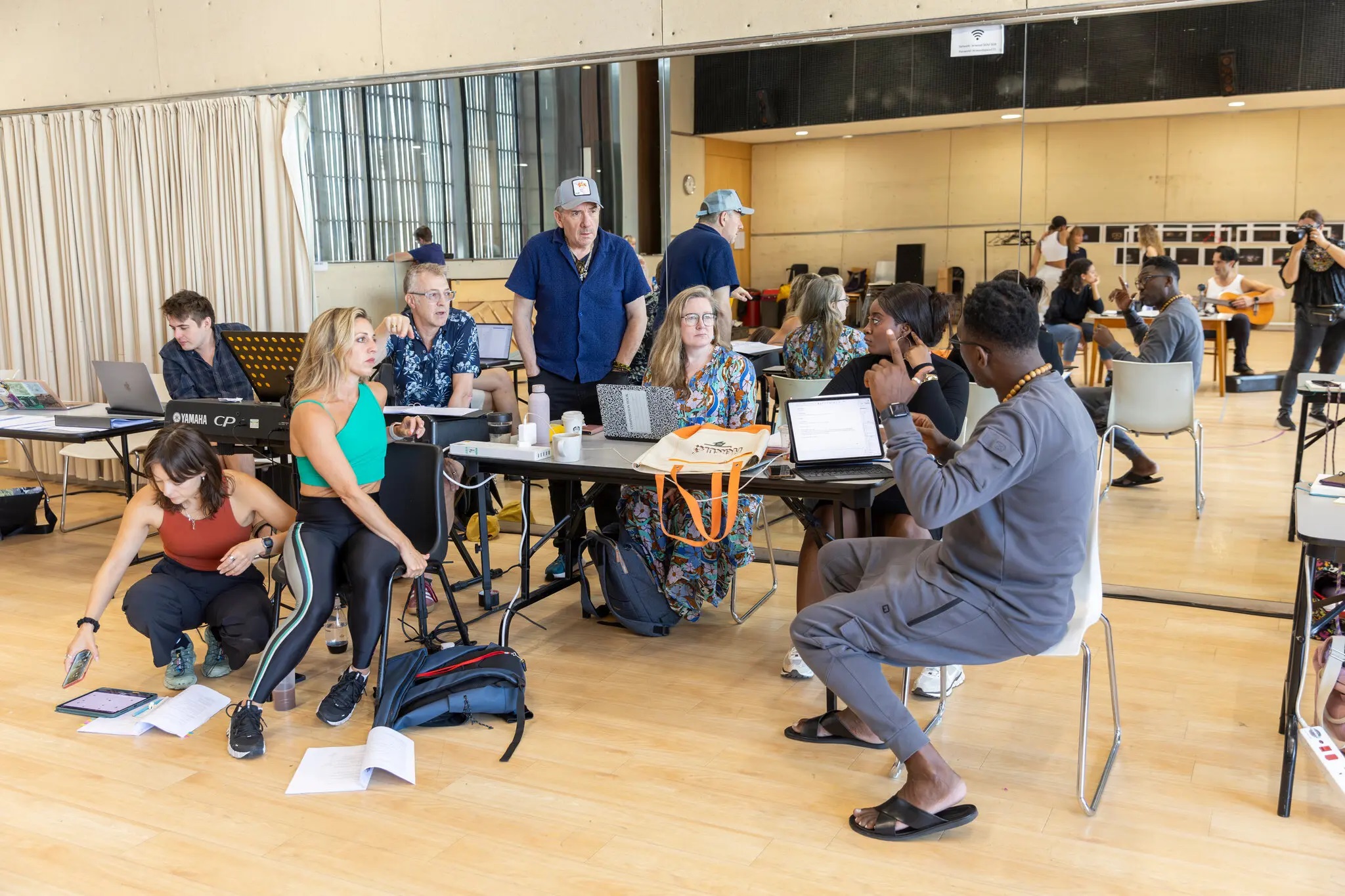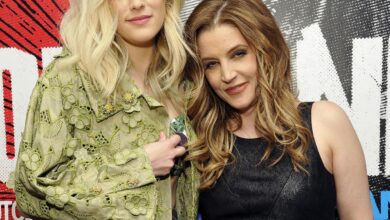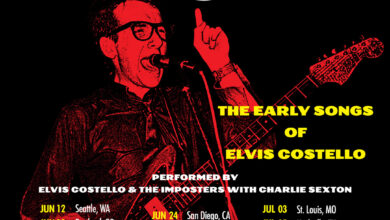‘A Face in the Crowd’ Isn’t About Trump. It Just Seems Like It.
Elvis Costello and Sarah Ruhl’s musical adaptation of the 1957 film, a satire about a hustler turned power-hungry TV personality, hits the London stage.

Stop me if you think you have heard this one before: A man gains television fame on the strength of his purported connection to everyday Americans and their resentment of elites, and before long he converts that fame into political influence in a right-wing presidential campaign.
That is the rough outline of the 1957 film “A Face in the Crowd,” which featured a pre-sitcom Andy Griffith as Lonesome Rhodes, a wild-eyed, guitar-slinging hustler who is discovered in an Arkansas jail by an ambitious radio producer and becomes a national phenomenon — until a hot mic moment reveals his bottomless contempt for his fans and they abandon him. Written by Budd Schulberg, based on a short story he had written years earlier, and directed maximally by Elia Kazan, “A Face in the Crowd” was an outlandish but eerily plausible speculative satire about the dangerous seductions of mass media.
Now it has been adapted as a musical with a book by Sarah Ruhl and songs by Elvis Costello, which is scheduled to open at the Young Vic in London on Sept. 20. Ruhl and Costello, talking amid rehearsals last month, took pains to stress that they don’t see their show as directly addressing the rise of Donald Trump, who turned television fame into political capital. But there is no escaping that, much as Schulberg’s original was partly responding to the hysteria of the McCarthy era, their musical version began gestating during Trump’s 2016 campaign for president, and a large part of it was written during that year.
“We’ve been careful not to tie the thing directly to Trump,” said Ruhl, “partly because it’s all there — Budd Schulberg was so prescient. There have been lines I’ve had to take out because they seemed too on the nose. At one point, some of the merch that Lonesome was selling included steak, something that Trump was also pushing.”

Costello also brushed aside a narrowly timely interpretation. “I’m resistant to the notion that this is an analogy,” he said. “It’s right in the title: It’s ‘A Face in the Crowd,’ not ‘The Face of Lonesome.’ It’s about what is within us that we can be persuaded to desire, and the fact that we desire it means it’s within us in the first place, like original sin.”
The director Kwame Kwei-Armah, who is wrapping up his seven-year Young Vic tenure with “A Face in the Crowd,” said that election-year timing was part of his reason for programming the show, “but I’d only say that was 20 percent of it.” Like Costello, he sees the show’s spotlight aimed as much at the audience as at the performers.
“I think we get the governments, the entertainers, and the media that we deserve,” said Kwei-Armah on a break from rehearsal at Jerwood Studios in Southwark, a borough of London. “If we didn’t deserve them, we wouldn’t let them influence us, right? The complicity has to sit with the people.”
The media players who facilitate this exchange bear some responsibility, too. It is the enterprising producer, Marcia Jeffries (played in the film by Patricia Neal, and in the musical by Anoushka Lucas), who stumbles upon Rhodes, and even coins his punny stage name. “She’s the Simon Cowell of her day, looking for the X factor, and she doesn’t necessarily know what she’s going to do with it,” Lucas said, referring to the “American Idol” judge and “X Factor” creator.
When Marcia realizes the monster she has helped create, she moves to destroy him, but doesn’t let herself — or the audience — off the hook. In a final speech in the show, Lucas said, her character asks: “How is it possible that we’re able to disown this person without looking at the ways in which we are accountable for how we got there? We can’t just condemn the individual and continue behaving in this manner.”
While Ruhl, an acclaimed American playwright, co-wrote an opera based on her play “Eurydice,” and Costello, the English singer-songwriter, contributed and reworked songs for last year’s London stage adaptation of Pawel Pawlikowski’s “Cold War,” this is the first full musical by either author to make it to the stage.
It’s not for lack of trying. When I asked Costello about other musical theater projects he has had in the works, he held up seven fingers and flashed a rueful smile. Two of those productions were with his frequent collaborator, Burt Bacharach, who died last year: one a stage version of their 1998 album, “Painted From Memory,” and the other a musical based on the Mike Myers film series “Austin Powers,” which Costello still can’t believe didn’t happen. “That would seem to be a home run, like winning the lottery,” he said.
Costello and Ruhl initially came together in the late 2000s to write a musical about the women-run, 1950s-era Memphis radio station WHER, but shelved it when they heard about “Million Dollar Quartet” and “Memphis.” As Costello put it, “How many musicals about Memphis in the ’50s can Broadway stand?”
American sounds and subjects have long been central inspirations for Costello, who once cheekily titled a record “King of America.” His songs for “A Face in the Crowd,” some of which he has been showcasing at concerts for nearly a decade, tap into some of that lifelong fascination. Lonesome’s songs, for example, are in a boisterous blues and country register, while Marcia has been given jazzier, torchier numbers.
While Costello cited Richard Rodgers and Frank Loesser as musical theater standard bearers, he said his “songwriting hero in this is Merle Haggard.”
“I have in my head, ‘How would Merle have done this?’” he explained. “You couldn’t always read him. He’d sing a song that appeared to be completely right-wing, and the next song he’d sing would be much more sort of — it wouldn’t even be about left and right. It would be about humanity.”

That humanity and ambivalence was evident in a rehearsal studio in Southwark one afternoon, as Ramin Karimloo, who’s playing Lonesome, worked his way in fits and starts through “The Last Word,” a number that is in many ways the show’s pivot point. It is Lonesome’s TV debut, and after an awkward start, he finds his footing by reuniting a squabbling real-life couple live on air, singing to them, “Don’t lose your first love/Looking for the last word.”
Then Lonesome steps forward, a bit out of the reality of the TV studio, into a reverie about his own troubled past. It’s a moment that embodies a line in Schulberg’s original short story, which calls Lonesome “a magnificent fake who can overwhelm himself with his own sincerity,” Ruhl said. “In a way, he’s the consummate actor — someone who can feel things profoundly and cause others to feel them profoundly. But there’s an illusion at the heart of it.”
Costello confessed that this moment still brings him up short.
“It’s a speech we’ve heard rehearsed before, but there was something about the way Ramin said it the other day where I went, ‘That was utterly sincere. I completely believed you when you said you cared about people.’”
The danger of that credulity, of course, is the show’s crux, and its organizing principle. As Ruhl put it, citing the critic John Lahr: “Musicals are spells of enchantment, in a way. Then you look at someone like Brecht, who was like, ‘I want to break the spell.’ What we felt tasked with in this was to have enough of the enchantment, but also to break the enchantment in a way.
“I feel like in America right now, it’s almost like we’re under mass hypnosis — or maybe, let’s say, 46 percent of the country is,” Ruhl continued. “You keep wondering, what will break the spell? In Budd Schulberg’s version, all it takes is putting Lonesome live on the air as he really is.”
Here the correlation between Lonesome and Trump would seem to break down, given the ardent support the former president maintains despite a long record of outrageous statements that would have disqualified other candidates. Costello could have been anticipating just this brand of politician when he wrote, in his 1980 song “The Imposter,” “When I said that I was lying, I might have been lying.”



